China scam run from Isle of Man
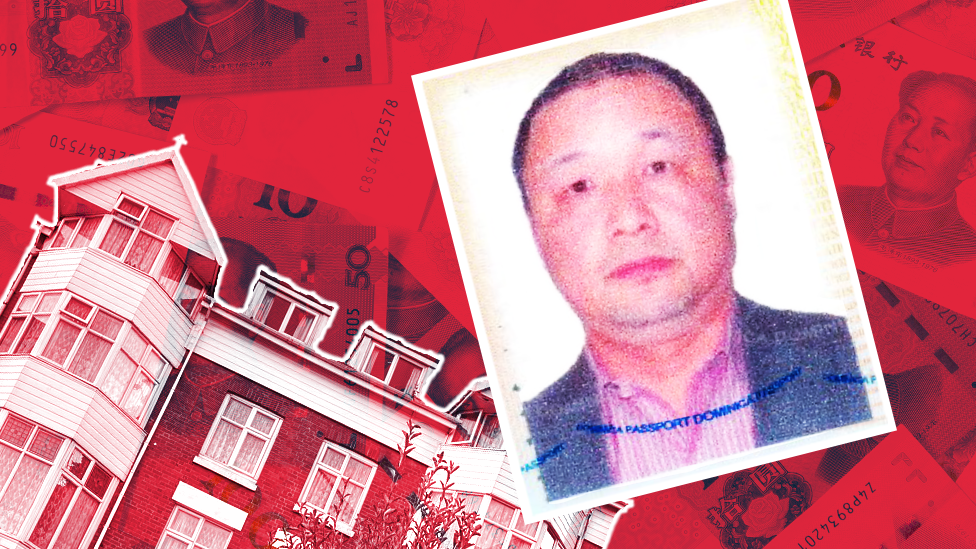
- Published
A seaside hotel and former bank offices on the Isle of Man have been used by scammers conning victims in China out of millions of dollars, a BBC World Service investigation has found.
The dining room and lounge at the Seaview Hotel in Douglas were packed with dozens of Chinese workers, we have been told, on computers hooked up to fast broadband. A specialist wok hob had also been delivered to the hotel’s kitchen.
The deception, which happened between January 2022 and January 2023 according to Chinese court documents, used a method known as "pig-butchering". It is so-called because the process of “fattening the pig” - gaining the victim’s trust - is vital to its success.
The BBC spent nearly a year establishing how the investment scam was carried out from the island, which is a British Crown dependency with an independent government.
We also uncovered other details, such as how bosses had big ambitions to build a state-of-the-art office complex overlooking the Irish Sea.
As well as obtaining court papers, we have accessed leaked documents and spoken to company insiders.
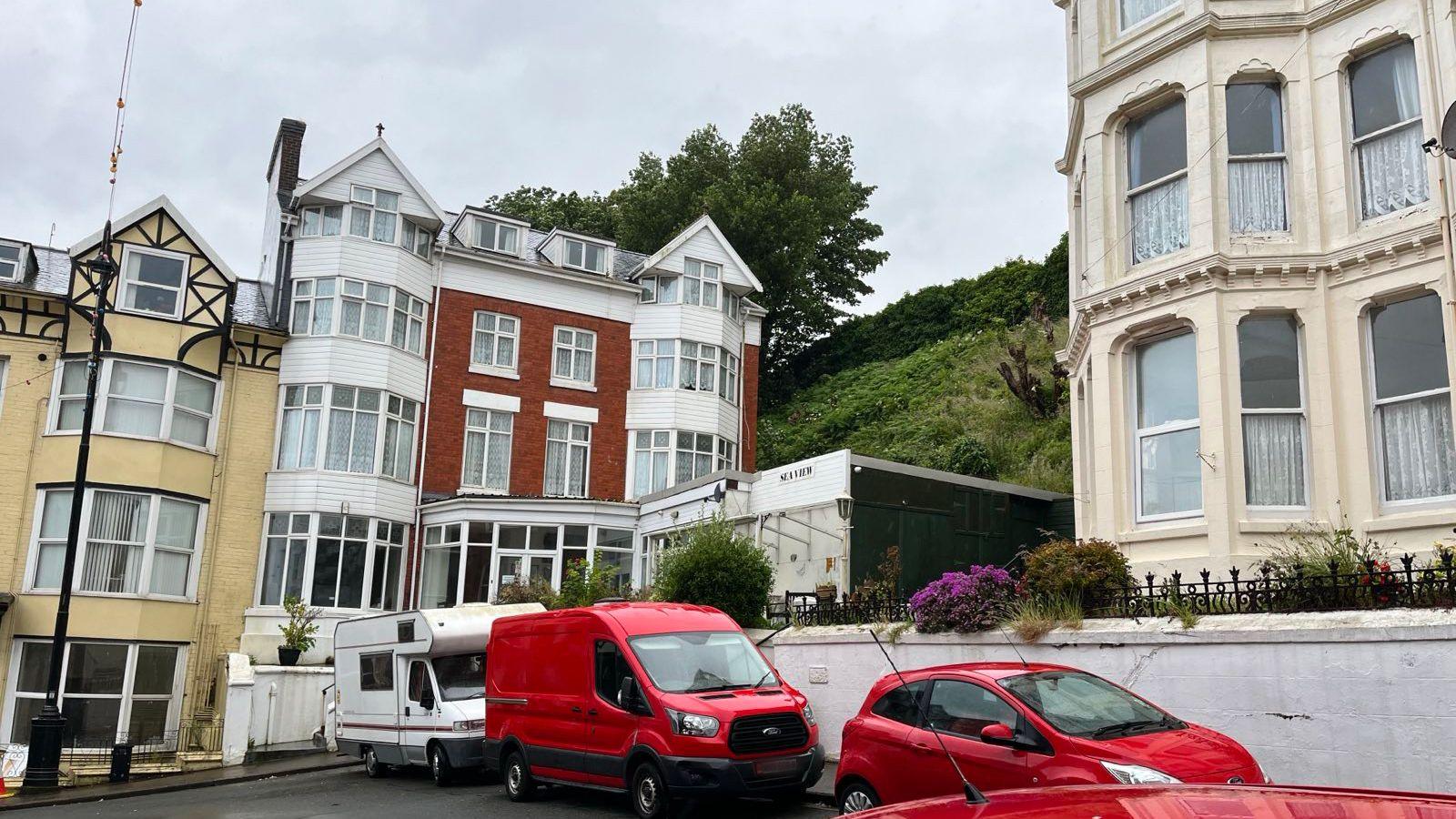
The Seaview Hotel in Douglas, where the Chinese scammers initially set up their work stations
One former member of staff, Jordan [not his real name], told us he had no idea of the murky world he was entering when he arrived on the Isle of Man. He says he was relieved to have found what he thought was a stable administrative job.
He did notice, however, that his new employer seemed quite secretive - for example, he and his colleagues were forbidden from taking photos at company social events. What he says he didn’t realise was that many of his Chinese colleagues were actually scam artists.
In late 2021, nearly 100 people had been transferred to the Isle of Man to work for a company which Chinese court documents refer to as "MIC". They had come from the Philippines where they had worked for another scamming firm. The BBC has discovered that MIC stands for Manx Internet Commerce.
On the Isle of Man, MIC was part of a group of associated companies - all with the same owner.
An online casino, run by King Gaming Ltd, was the most prominent. In mainland China, gambling is illegal. Setting up halfway around the world meant the group's founders could target Chinese customers, but also take advantage of the Isle of Man’s low gambling taxes.
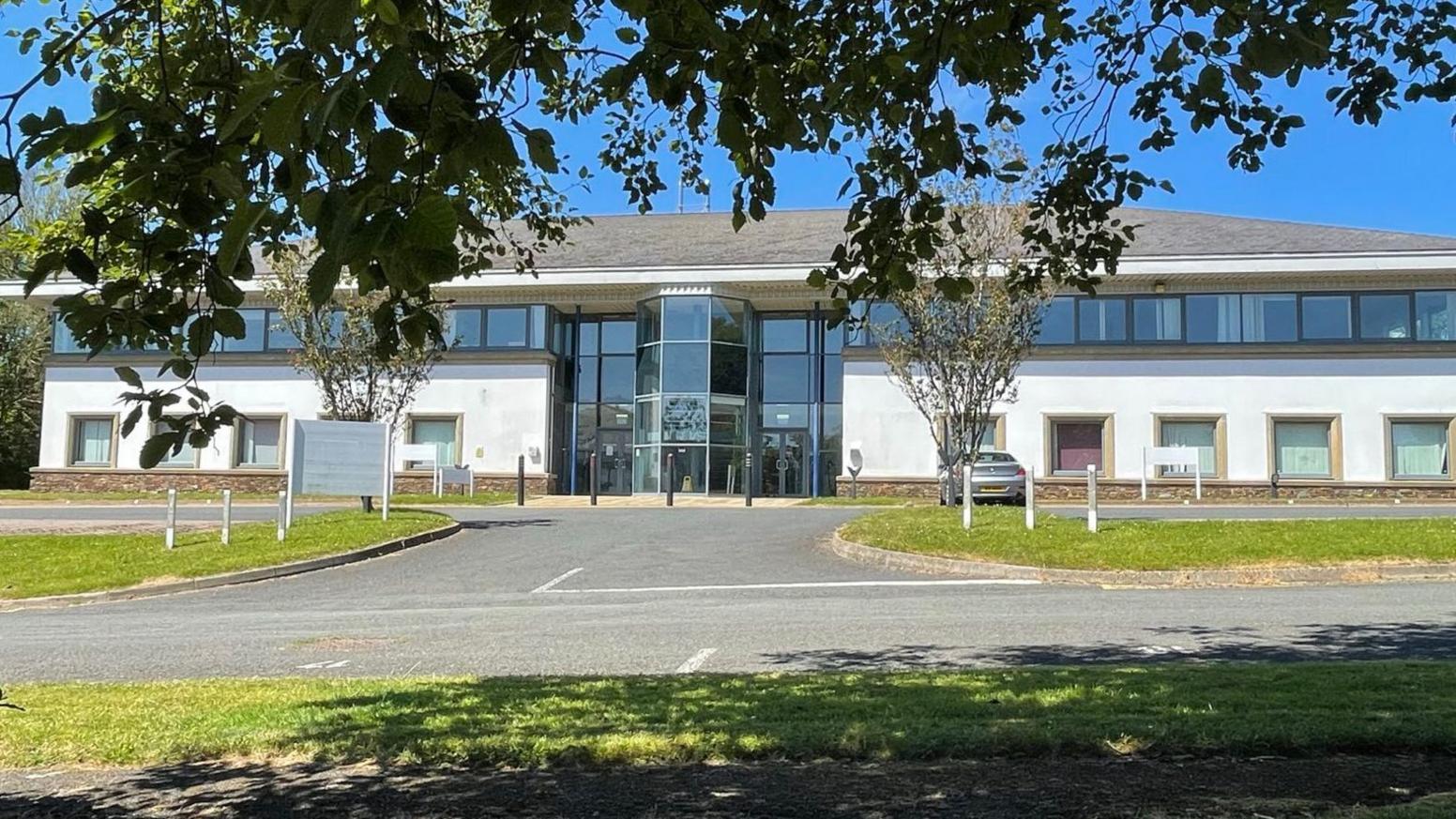
The Chinese scammers later moved to former bank offices
A few months after being based at the Seaview Hotel in Douglas, the MIC workers were moved to former bank offices on the east side of town.
And this is where Jordan says he would hear sporadic cheering from his new colleagues - who worked in groups of four. He now believes they were celebrating moments when they had successfully scammed another victim, some 5,000 miles away.
Six people who worked for MIC in Douglas have now been convicted - upon their return home to China - of carrying out investment scams against Chinese citizens.
The cases, heard in late 2023, detail the illicit money stream. Victims were lured by the defendants and their accomplices from bases on the Isle of Man and in the Philippines, according to the Chinese court papers.
They say the defendants would work in teams to pull Chinese investors into chat groups on QQ - a popular Chinese instant messaging service similar to WhatsApp. One scammer would play the role of an investment "teacher", and others would pretend to be fellow investors.
The BBC has seen evidence - including in the court papers - that many of those who arrived in Douglas from the Philippines were engaged in the scams. All used the same computer equipment, depended on QQ for their work and, with the exception of a few managers, all held the same job title.
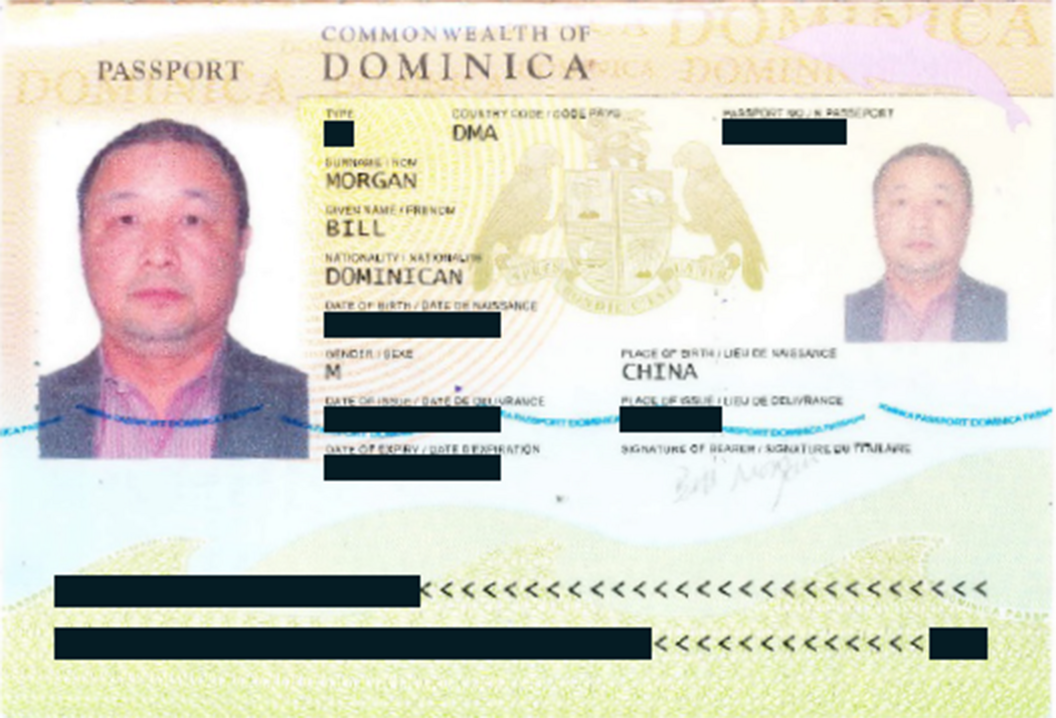
The companies' sole beneficiary Bill Morgan, also known as Liang Lingfei
The fake investors would build an atmosphere of hype and excitement around the money-making skills of the "teacher", who would then tell the victim to put money into a particular investment platform, the Chinese court found.
Dazzled by the hype, the victim would comply, only for their funds to be syphoned off by the scammers, who actually controlled these platforms and could manipulate them from behind the scenes.
The Chinese court said it was difficult to verify the victims' total losses - but it said 38.87m renminbi (£4.17m/$5.3m) had been taken from at least 12 victims.
Relying on evidence including the defendants’ own confessions, as well as travel and financial records and chat logs, the court found the six defendants guilty.
This was not only a profitable but also a sophisticated scam, say the court documents, requiring front line teams to deploy the "pig-butchering" techniques with persuasiveness and skill.
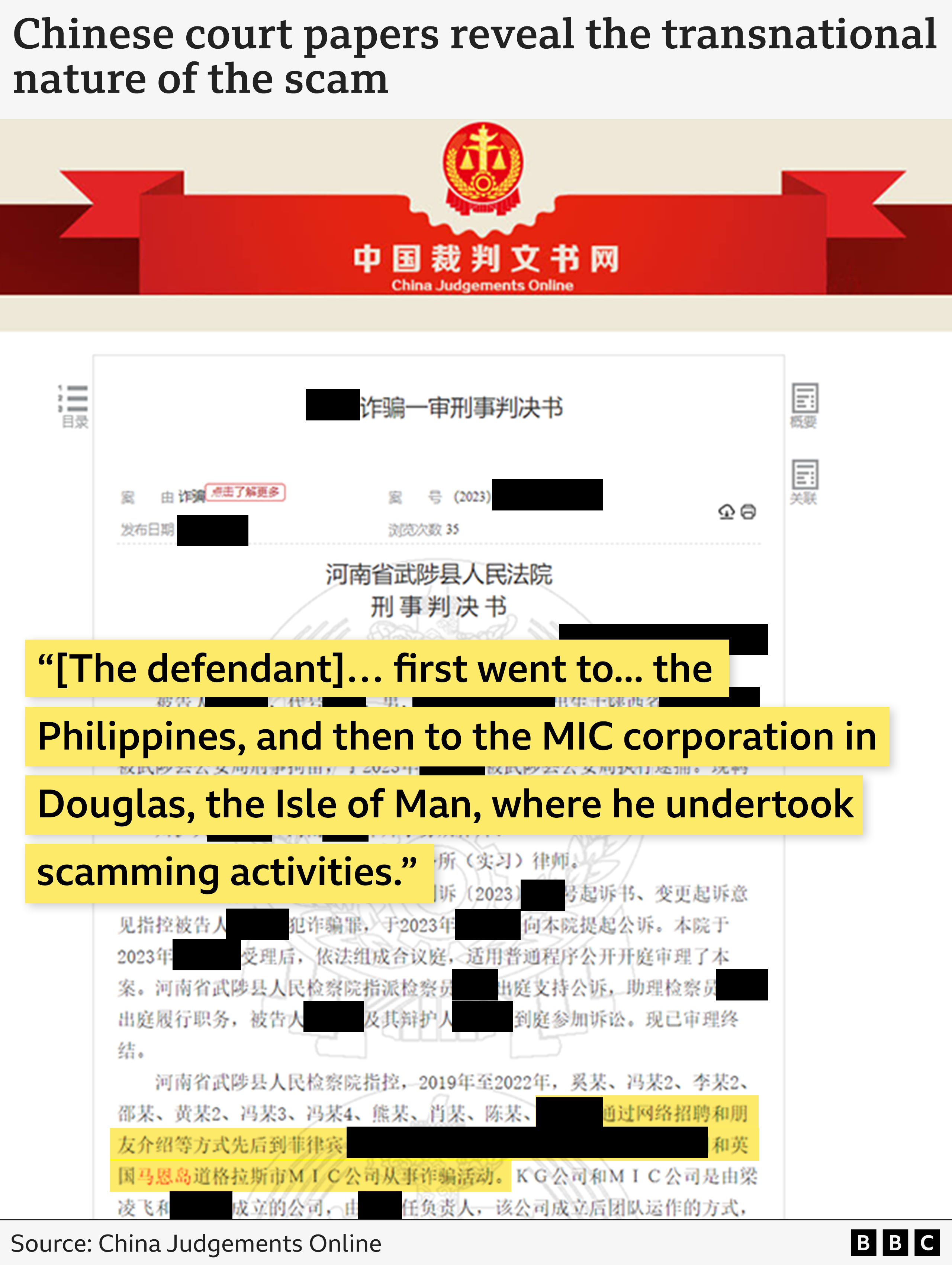
The BBC has discovered the identity of the companies' sole beneficiary. His name was hidden behind layers of administrative paperwork.
MIC and its affiliate companies were all held by a trust set up by an individual named "Bill Morgan" who, documents show, was also known as Liang Lingfei. Employees called him "Boss Liang", says Jordan.
The Chinese court papers refer to a man called Liang Lingfei being the co-founder of MIC on the Isle of Man - which it described as "a fairly stable criminal organisation established in order to carry out scam activities". Mr Liang was not one of those prosecuted or represented at the hearings.
The court stated that Mr Liang was also co-founder of the scamming organisation in the Philippines. The BBC has seen evidence that many MIC employees worked there before being transferred to the Isle of Man.
Our investigation has also found that Mr Liang obtained an Isle of Man investment visa and attended multiple company events on the island. His wife also owns a home in the town of Ballasalla, near the island’s airport.
The group of companies on the Isle of Man was ambitious, having signed a planning agreement late last year for a glitzy "parkland campus" headquarters on the site of a former naval training base. A spokesperson for the developers described it as the "largest single private investment in the Isle of Man".
Architects’ images show office buildings set on a hill above the seafront in Douglas. Inside would have been penthouse apartments, a spa, multiple bars and a karaoke lounge.
The campus was to be used by MIC staff and those working for MIC's "affiliate" companies, including those involved in online gambling, planning documents state.

A mock-up of the glitzy campus the group was planning to build
Conservative estimates put the global annual revenues of the "pig-butchering" industry at more than $60bn (£46.5bn).
"This is the first such case we've seen of one of these [pig-butchering] scam operations setting up in a Western country," says Masood Karimipour, South East Asia representative at the UN Office on Drugs and Crime.
Trying to stop the scams is like a "game of whack-a-mole", he says, and it is a battle that "organised crime is currently winning" as criminals engage in what he calls "jurisdiction shopping" where they perceive there to be legal loopholes and little oversight.
Any ambitions the group of companies may have had on the Isle of Man - legitimate or otherwise - appear to have come to an end.
In April, police raided the former bank offices. They also targeted an address next to the island's Courts of Justice building - using a ladder to enter through a first-floor window in the early hours of the morning.
In a statement released shortly afterwards, police said the raids had been in connection with a wider fraud and money laundering investigation in relation to King Gaming Ltd IOM. Seven people had been arrested and released on bail, they added.
Since then, a further three people are known to have been arrested.
Receivers were appointed earlier this month for companies in the group - including MIC and King Gaming Ltd IOM - at the request of the Isle of Man's attorney general.
The island's gambling regulator has stripped MIC's gambling affiliate companies of their licences.
The parkland campus site was cleared of trees and signage went up - but the redevelopment is now on hold indefinitely.
The BBC has made repeated attempts, via several methods of communication, to contact the companies involved - as well as Bill Morgan/Liang Langfei and company directors - but has received no replies.
We have also attempted to contact the Seaview Hotel, but have received no response, though there is no suggestion that anyone there was aware of any illegal activities taking place on the premises.

You can reach the Global China Unit directly and securely through encrypted messaging app Signal on: +447769939386 or by email at wsinvestigations@bbc.co.uk